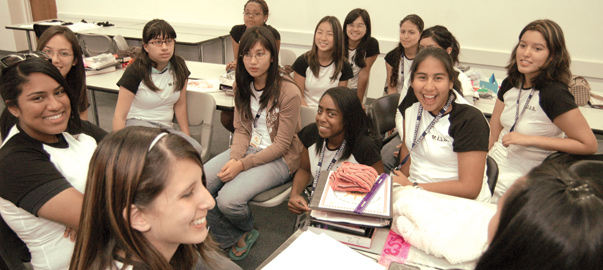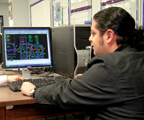Programs Promoting Student Success
CSUF offers many programs on science, technology, engineering and mathematics
January 29, 2007
By Russ Hudson and Debra Cano Ramos
The following are a few of Cal State Fullerton’s programs that aid
students studying science, technology, engineering and mathematics.
Title V Retention Programs
In 2004, CSUF received a five-year $2.3 million grant from the U.S. Department of Education to help increase services and programs. As a result, a number of programs have been created to focus on increasing the retention of students in math- and science-based majors, providing support for academic success and encouraging careers in those areas through various programs, including the Study 25-35 Campaign.
CASECS
Computer engineering student Bryan Moore knows the value of the Center for Academic Support in Engineering and Computer Science (CASECS) Study Center.
“The CASECS Study Center has been vital to my progression through school,” said Moore, who plans to graduate in 2009.
Located on the second floor of the College of Engineering and Computer Science, students can go there day and night to study, work with peers, meet with tutors or relax between classes. There are conveniences such as lockers for weighty textbooks and computers. The study center is one of a number of services provided by CASECS, a program designed to recruit, retain and graduate students in engineering and computer science.
ECS Scholars
The ECS Scholars Program began in September and places first-year students majoring in engineering or computer science in a “learning community.” Freshmen take core classes together and attend study group sessions that assist with their learning. Tutors are assigned to work with students and attend classes with them, as well as lead study group sessions. Twenty-two students participated in the program in the fall.
The program is a collaborative effort between the Center for Academic Support in Engineering and Computer Science (CASECS) and the University Learning Center (ULC).
MESA
The Mathematics, Engineering, Science Achievement (MESA) program, run by Vonna Hammerschmitt, exposes students in grades 6 through 12 to those disciplines. MESA works with all the high schools in Santa Ana, as well as Costa Mesa and Valencia high schools in Costa Mesa, and Kramer Intermediate School in Placentia. The goal in the intermediate-level grades is to make science, mathematics and engineering fun and interactive, and participants can earn high school science class credit. In high schools, the classes focus on mentoring, doing well on the Scholastic Aptitude Test and in preparing to go to a college.
MARC SCHOLARS PROGRAM
The Minority Access to Research Careers (MARC) program, established more than a decade ago, exposes undergraduate students
to various types of research and the skills necessary to enter and succeed in graduate programs.
Program participants are required to complete specific science courses, conduct an average of 15 hours of research per week during both semesters of the academic year plus full time for eight weeks in the summer, conduct a specific research project that culminates in a senior thesis, and defend their findings before a thesis committee at the end of the program. MARC scholars attend a weekly seminar where they read scientific papers, learn how to develop research presentations and hear from guest speakers. They also are expected to attend and deliver presentations at local and national professional meetings.
Peer Group Program
The Peer Group Program is for freshman studying math, science, engineering and computer science. One peer adviser is assigned to each college (College of Natural Sciences and Mathematics and College of Engineering and Computer Science) and serves as a group facilitator for peer group members. The adviser also is responsible for planning weekly group meetings. Each week, the groups discuss different topics, such as time management, study skills, campus resources and career options.
Project MISS
Begun in 1990 by David L. Pagni, professor of mathematics, Project MISS (Mathematics Intensive Summer Session) is geared to enhancing the math skills of 10th- and 11th-grade females from Orange County and surrounding communities. Since its inception, 98 percent of Project MISS participants have completed high school and entered college — 20 percent majoring in science, technology, engineering
and math.
What Is Engineering?
“What Is Engineering?” is not only a legitimate question, but also the name of a program run by Johns Hopkins University in Maryland. Last summer, 21 qualified area high school students were able to participate in the rigorous four-week program, and next summer, said Vonna Hammerschmitt, director of the MESA program, perhaps as many as double that can participate.
“We’re planning to have two groups,” she said. “One will be up to 21 qualified MESA students, like this last time, and the other group will be up to 21 other students, but although it will be free again for MESA students, it will be $1,700 for each student in the second group.”
Those who get an A or B in the four-day-a-week-plus-homework course will not only get a high-quality crash course in engineering principles and the things that go with them, but will get three units of credit at Johns Hopkins.


